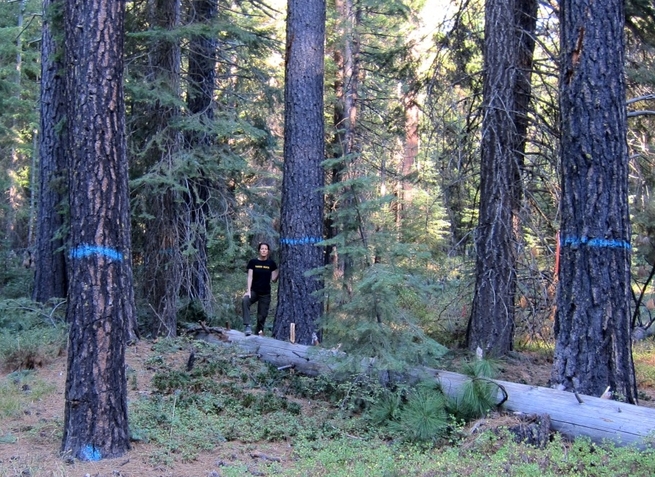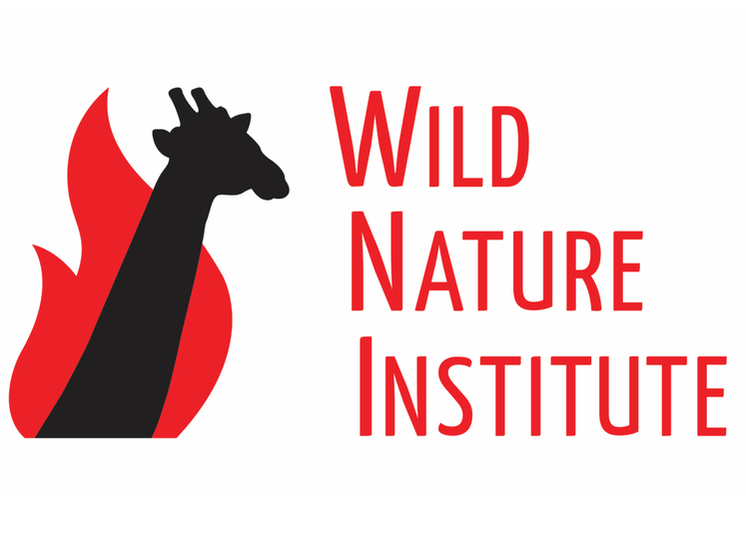 These large-diameter old-growth trees marked for logging in a US Forest Service fuels reduction project are typical of what is often described as 'thinning'. Logging like this, done under the pretense of fire risk reduction, is the reason Spotted Owl populations are crashing in National Forests, scientists say. Credit: Wild Nature Institute These large-diameter old-growth trees marked for logging in a US Forest Service fuels reduction project are typical of what is often described as 'thinning'. Logging like this, done under the pretense of fire risk reduction, is the reason Spotted Owl populations are crashing in National Forests, scientists say. Credit: Wild Nature Institute Monica Bond has spent the past 15 years studying spotted owls and forest fire. This week, Bond published an article summarizing existing science about what happens to spotted owls when forests burn, in the hope of averting a major US forest management policy disaster. US Forest Service (USFS) manages 11 million acres of public forest land in California's Sierra Nevada. The USFS has a new California spotted owl conservation strategy and is revising its forest management plans for Sierra Nevada national forests. These documents will guide how national forests are managed for the coming decades, and they are deeply misinformed about fire. The status of spotted owls tells the USFS how its management activities affect old-growth species. Since 1993 when the USFS began managing for California spotted owl habitat, populations of spotted owls have crashed on USFS lands. In contrast, spotted owl populations are stable in National Parks Service (NPS) lands. Both USFS and NPS lands have wildfires, but NPS lands are not logged. Logging on 1.2 million acres of USFS land in the Sierra Nevada between 1994 and 2014 is driving spotted owl declines. In Bond's summary paper[1], published by Elsevier Press as a Reference Module in Earth Systems and Environmental Sciences, she presents a data-driven narrative describing how forest fires, including big, severe megafires, have no strong negative effects on spotted owl populations. For example, in the largest and most comprehensive Sierra Nevada study to date[2], burned and unburned owl territories had the same probability of being occupied—even when about a third of the territories' area burned at high severity. "The lack of effect was remarkable because we found it repeatedly," said Bond. "We kept investigating different aspects and the story didn't change. Owls were harmed by logging, not by fire." These results make perfect sense in light of the history of the Sierra Nevada. Forest fire in the Sierra is typically mixed severity, meaning it includes some large patches of high severity fire, and is as natural and necessary to forest health as rain or sunshine. "The increased abundance and diversity of plants and animals in high severity burns tells us the Sierra Nevada's flora and fauna evolved with regular high severity fires." said Dr. Richard Hutto of University of Montana's College of Forestry and Conservation. However, Bond's results are troubling to the USFS and scientists on the USFS payroll. The new California spotted owl conservation strategy was written entirely without consulting Bond. A forest oversight organization asked the USFS to include her, but those requests were ignored. The USFS gets billions of dollars each year to fight fires, and millions more to administer sales of public lands trees to timber companies under the pretence of reducing fire risk. The three studies that examined spotted owl responses to logging all showed negative impacts from fuels reduction thinning. Thirteen scientific papers found no strong negative effects of high-severity fire on owl populations. Yet the USFS plans promote logging under the pretence that logging will save the owls from fire. Bond concluded, "There is a US forest policy train, about to leave the California station, which aims to promote widespread logging on public forests. The logging will be expensive, ineffective at stopping wildfire, and ecologically damaging, and it will be paid for by the taxpaying citizens of the USA. We must change the track." More information: [1] Bond ML (2016) The Heat Is On: Spotted Owls and Wildfire. Reference Module in Earth Systems and Environmental Sciences, dx.doi.org/10.1016/B978-0-12-409548-9.10014-4 [2] 11 years of occupancy data from 41 burned breeding sites before and after 6 large fires, were compared with 145 long-unburned control sites during the same period (Lee et al. 2012). Read at: http://phys.org/news/2016-08-degrading-national-forests.html#jCp
0 Comments
Your comment will be posted after it is approved.
Leave a Reply. |
Science News and Updates From the Field from Wild Nature Institute.
All Photos on This Blog are Available as Frame-worthy Prints to Thank Our Generous Donors.
Email Us for Details of this Offer. Archives
July 2024
|
|
Mailing Address:
Wild Nature Institute PO Box 44 Weaverville, NC 28787 Phone: +1 415 763 0348 Email: [email protected] |
|

 RSS Feed
RSS Feed
